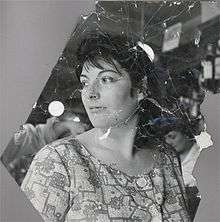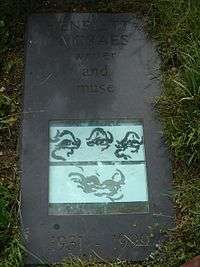Henrietta Moraes

Henrietta Moraes (22 May 1931 – 6 January 1999) was a British artists' model and memoirist. During the 1950s and 1960s, she was the muse and inspiration for many artists of the Soho subculture, including Lucian Freud, Francis Bacon, and (much later) Maggi Hambling, and also known for her marriages and love affairs. She left her first husband, Michael Law, and married actor Norman Bowler, with whom she had two children. She later married the Indian writer Dom Moraes.
Early life and modelling

She was born Audrey Wendy Abbott in Simla, India, where her father was stationed in the Indian Air Force. Her father deserted her mother when Audrey was young, and she was raised harshly by a tyrannical, abusive grandmother in England. Later she went to secretarial college.
By 1950, when she was nineteen years old, Moraes was working as an artists' model in several London art schools. A denizen of the Colony Room, Soho, she became the muse to a number of important British artists in the early 1950s through the mid-1960s. Francis Bacon, who was particularly enthralled by her mercurial character, painted her at least sixteen times from photographs specifically commissioned by him from John Deakin: in May 2002, Bacon's "Study for Portrait of Henrietta Moraes" was sold by Ernst Beyeler for $6.7 million,[1] and in February 2012 Bacon's 1963 "Portrait of Henrietta Moraes" sold for £21.3 million.[2][3] Lucian Freud, with whom she had an affair, painted Moraes at least three times, including a celebrated 1953 portrait entitled Girl in a Blanket.[4]
Moraes was notoriously free-spirited and led a generally hedonistic lifestyle. In the 1960s, she was an unsuccessful cat burglar hampered by amphetamine psychosis, leading to time in Holloway Prison. As if anticipating her decline, Bacon famously painted her with a syringe a decade before she became a self-confessed "junkie". Later in life, she found sobriety and penned a volume of short stories and memoirs (entitled Henrietta) with the encouragement of her friend, the writer Francis Wyndham.
Relationships
In 1950, she met her first husband, film-maker Michael Law, who bestowed the name Henrietta on her.[5] Her second husband was bodybuilder and actor Norman Bowler. They had two children, Joshua and Caroline, although Joshua was later revealed to be the biological son of Colin Tennant, 3rd Baron Glenconner.[6] This marriage ended in 1956. Later in 1956, she met the 18-year-old Indian poet Dom Moraes. They married in 1961 but were amicably divorced by the mid-1960s.
In the mid-1970s, Moraes shared a mews flat in Hanover Terrace, Regent's Park, with singer and actress Marianne Faithfull, an episode in both their lives that forms a key chapter in Faithfull's Memories Dreams & Reflections, published in October 2007. In the late 1970s and early 1980s Moraes was caretaker of Roundwood House, near Mountrath, County Laois, Ireland, which was being restored by the Irish Georgian Society. Many friends visited, and her friend Eric Burdon recorded Darkness Darkness there. Guinness heiress Caroline Blackwood discreetly paid school fees for Moraes's two children during her most untethered years, although Henrietta was not told about it.

She started to write about her life in the book Henrietta, published by Hamish Hamilton in 1994, and was working on a follow-up at the time of her death. She attended a Twelve-step program to learn how to live without alcohol and drugs. She was diagnosed with diabetes soon after becoming a keen gardener in West London. In her last year of life she was in a relationship with artist Maggi Hambling, who produced a posthumous volume of charcoal portraits of her.
Death
Moraes died in London in 1999 in her bed while on the phone to her doctor, bequeathing her long-haired dachshund dog Max to Maggi. She left only a handful of possessions and a large pile of unpaid bills.
She is buried in Brompton Cemetery, London. Her coffin was hand-made by her friend Sir Mark Palmer. She had spent time with Palmer in the early 1970s in his "cavalcade of horse-drawn caravans" as part of an aristocratic early group of New Age travellers.[7]
Legacy
On 14 February 2012, Bacon's 1963 "Portrait of Henrietta Moraes", which features Moraes naked and sprawled on a bed, sold for £21.3 million at Christie's in London.[8]
References
- ↑ Daily Telegraph, Madness in Manhattan New York sales 20 May 2002.
- ↑ "Gallery Talk: Francis Bacon's 'Portrait of Henrietta Moraes', King Street Sale, 14 February 2012". Christie's. Retrieved 14 February 2012.
- ↑ "Francis Bacon, 'Portrait of Henrietta Moraes', Christie's auction results 14 February 2012". Christie's. Retrieved 14 February 2012.
- ↑ ""Girl in a Blanket (Portrait of Henrietta Moraes)", Lucian Freud, 1953". Wikipaintings.org.
- ↑ See Michael Law, obituary, Telegraph 2001. A film reflecting Law's typical humour is "Pedestrian Crossing" from 1948, archive.org.
- ↑ "Glenconner recognises his illegitimate son Joshua in his will". Daily Telegraph. 29 August 2010.
- ↑ Scott, Caroline (22 January 1999). "'She wasn't equipped to be a mother'". The Daily Telegraph. Retrieved 2 August 2014.
- ↑ "Francis Bacon's 'sexually charged' portrait fetches £21m". Daily Telegraph. 15 February 2012.
External links
- Obituary in The Guardian
- Museum of Modern Art: "Three Studies for the Portrait of Henrietta Moraes", Francis Bacon, 1963
- RTE Radio One Documentary on One – Oiled: A Portrait of Henrietta